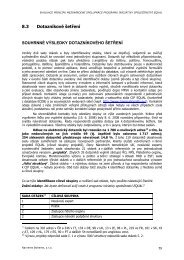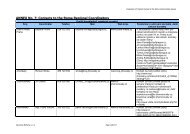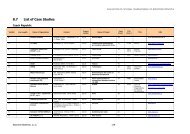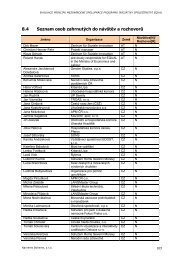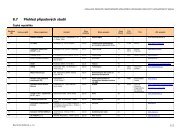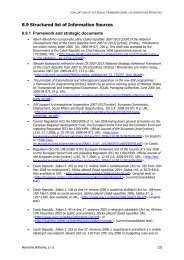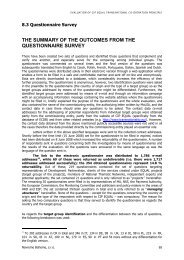EQUAL - Final report - eng - navreme
EQUAL - Final report - eng - navreme
EQUAL - Final report - eng - navreme
Create successful ePaper yourself
Turn your PDF publications into a flip-book with our unique Google optimized e-Paper software.
EVALUATION OF CIP <strong>EQUAL</strong> TRANSNATIONAL CO-OPERATION PRINCIPLE<br />
We understand the question, in which way it would be possible, from the part of the programme<br />
managing authority, to prevent or at least to minimise the found negative factors, at two levels: 1) the<br />
concrete steps related to the roles of the managing and support structure, costs for the transnational<br />
cooperation, l<strong>eng</strong>th of the preparatory period, created information tools are concerned, and 2) the<br />
point is, which new or innovated tools concerning both the obligatory structure (terms and conditions)<br />
and the auxiliary structure for the projects MA can create.<br />
6.7 Topic 6: Part of the study focused on the synthesis of the<br />
findings from previous parts of the study (part 2)<br />
Subtopics:<br />
Factors of success and failure, roles, suitability and unsuitability of supporting tools, forms of<br />
announcement of calls, cooperation in monitoring, stage of closure of projects and possible roles in it.<br />
Partial evaluation outputs to the second part of topic 6:<br />
The Third Interim Report (19 September), output No. 5 of the project<br />
Short summary of the process:<br />
The <strong>report</strong> was drawn up as a complex analysis of focus groups and evaluation of processes, it<br />
contained conclusions and recommendations.<br />
Short summary of partial outputs (basic findings):<br />
This part of the study focused on the recommendations directed into the area of systemic utilisation of<br />
the selected outputs and results of the projects financed from the ESF, when it was considered on the<br />
one hand when this support should start (from preparation of the projects till the period of projects’<br />
closure), and on the other hand how to implement this support. Both the possibilities of external<br />
solution (external agencies) and the means of systemic projects, where both the support of<br />
preparation of strong transnational partnerships and mainstreaming of outputs and results of their<br />
work may be concerned, were considered. The sense of further utilisation of the projects’ outputs and<br />
results consists in it that their quality improves in this way, the parallel development of similar or<br />
same products is eliminated and mainstreaming is supported significantly. The role of the managing<br />
authority can be seen for example as an administrator of a central platform, which would present<br />
individual outputs of the projects classified – besides other criteria – according to the target groups.<br />
Since the target groups are given by the respective operational programmes and further by the<br />
orientation of the individual projects actually implemented, the question then does not consist in who<br />
the outputs should be mediated to, but above all how. The evaluation team’s proposals mentioned for<br />
example information campaigns (including TV spots, billboards and other means of traditional<br />
advertising), Internet advertising and viral marketing (in general, this is possible to be used for<br />
everything, a communication method is concerned), support to thematic networks with bigger accent<br />
on expert authority, national, as the case may be thematic competitions, conferences and fairs and<br />
further the events specifically focused and made to measure to concrete target groups.<br />
As regards the models of financing, common budget sources, revenues, systemic projects, national<br />
projects may be used. As regards the cost factors of the project outputs, the Cost-Benefit Analysis<br />
(CBA) may be included in the project applications; as regards the systemic and budget means, then<br />
the strategic decisions at the level of ministries are concerned, as the case may be of concrete<br />
operational programmes. The rule is valid that the system of support to outputs and results of the<br />
projects must be transparent at the most for a selective (not a flat) matter will be obviously<br />
concerned. Further, this system will be introduced newly therefore it will be necessary at the<br />
beginnings of the implementation to verify, whether the support really achieves the stipulated<br />
objectives and quality. Thus the evaluation will proceed by means of common techniques of social and<br />
economical analysis – namely already at the selection of the projects, in course of creation of the<br />
outputs and also after the termination of the projects and handover of the outputs – on the basis of<br />
data obtained through monitoring and specific evaluating procedures - on the basis of the criteria<br />
known in advance contained in the operational programmes, in the calls and, as the case may be also<br />
in assignments of systemic/national projects. But the evaluation methods could be applied also for the<br />
decision-making process itself, which will be necessary before the beginning itself of the mentioned<br />
Navreme Boheme, s.r.o. 47



